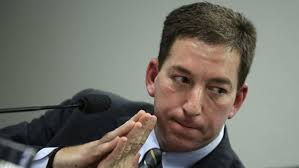Sunshine with a point of view

By Jon Cassidy | Watchdog.org
George Orwell couldn’t get a job at your local newspaper.
“My starting point is always a feeling of partisanship, a sense of injustice,” Orwell once wrote. “When I sit down to write a book, I do not say to myself, ‘I am going to produce a work of art.’ I write it because there is some lie that I want to expose, some fact to which I want to draw attention, and my initial concern is to get a hearing.”
Orwell’s coverage of the Spanish Civil War made him a legend, one of the great journalists of the century. And yet his willingness to take sides would get him written off by a modern editor who sees just one way to do journalism – the way it’s been done in this country for the last half-century.
The faux objective approach is so wrought into journalists they struggle to accept there are other, possibly better, ways to do the job.
PULITZER MATERIAL? Glenn Greenwald published the leaked NSA documents, but the Pulitzer board may deny him the prize.
Journalists call it objectivity, but it’s a pose. It’s a way of pulling punches with sources to maintain access, to downplay wrongdoing to keep doors open. If you’re on a beat where you have little access to public records, it’s often the only way to do your job.
That is only one reason, a big reason, why sunshine laws matter. Get your hands on documents, written proof and you can speak the truth plainly. Public records get reporters out of the toxic environment of calculating the price of access.
Watch the Pulitzer Prize Board this year and see if it can convince itself to honor Glenn Greenwald, the journalist responsible for breaking us the news that we are now living in an East German surveillance state. His is the biggest scoop of all time, the one bit of journalism in recent memory that deserves comparison to the sun.
Yet the deans of journalism will agonize, not so much on the merits of the disclosure. The New York Times got Pulitzers in 1972 for publishing the Pentagon Papers and in 2006 for the Bush administration wiretapping stories.
But they will struggle with Greenwald, who clearly has opinions, is unashamed of them, yet dares to call himself a reporter.
Greenwald didn’t get his files through any Freedom of Information Act request, of course. But his success illustrates why public records laws are so crucial to truth-telling journalism.
“I approach my journalism as a litigator,” Greenwald once said. “People say things, you assume they are lying, and dig for documents to prove it.”
That is how I approach my work. Plenty often, it turns out people tell the truth. But if you’re not out there digging up and poring over the record, finding out when they’re not, then you’re just going to end up repeating their lies.
Contact Jon at jon@watchdog.org.
The post Sunshine with a point of view appeared first on Watchdog.org.







